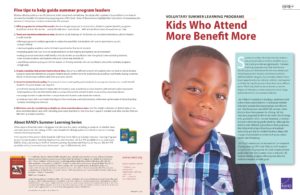

Summer is a time when low-income students lose ground relative to their wealthier peers, but it also presents an opportunity: Summer learning programs may help low-income children prepare themselves for the next school year. And programs that include enrichment activities address another inequity: Low-income children have fewer opportunities for cultural, athletic, and outdoor activities during the summer than their more affluent peers. Until now, little has been known about the impact of voluntary summer programs run by large urban districts for low-income students.
The Wallace Foundation is funding a multiyear study in five urban school districts to determine whether voluntary summer learning programs are effective and what factors are associated with success. This brief summarizes the outcomes of two summers of programming (2013 and 2014) on 3,192 students accepted into the programs who had completed third grade before the first summer. Future research will analyze whether program effects persist after the students complete seventh grade.
see allThere is an unprecedented sense of urgency, calls to action, and investment of resources from... read more
Introduction Across grade levels, afterschool programs are helping young people find their passions, express themselves,... read more
Helping teachers improve their instructional practice through high-quality professional learning opportunities is a key strategy... read more
The National Summer Learning Project (NSLP), an initiative of The Wallace Foundation, consists of five... read more